The Google Nexus 9 Review
by Joshua Ho & Ryan Smith on February 4, 2015 8:00 AM EST- Posted in
- Tablets
- HTC
- Project Denver
- Android
- Mobile
- NVIDIA
- Nexus 9
- Lollipop
- Android 5.0
CPU Performance
While Denver’s architecture is something fascinating to study, it’s important to see how well this translates to the real world. Denver on paper is a beast, but in the real world there are a number of factors to consider, not the least of which is the effectiveness of NVIDIA’s DCO. We’ve laid out that Denver’s best and worst case scenarios heavily ride on the DCO, and for NVIDIA to achieve their best-case performance they need to be able to generate and feed Denver with lots and lots of well optimized code. If Denver spends too much time working directly off of ARM code or can’t do a good job optimizing the recurring code it finds then Denver will struggle. Meanwhile other important factors are in play as well, including the benefits and drawbacks of Denver’s two cores versus competing SoC’s quad A15/A57 configurations, and in thermally constrained scenarios Denver’s ability to deliver good performance while keeping its power consumption in check.
In order to test this and general system performance, we turn our suite of benchmarks that include browser performance tests, general system tests, and game-type benchmarks. As Denver relies on code-morphing to enable out of order execution and speculative execution, most of these benchmarks should be able to show ideal performance as loop performance in Denver is basically second to none. While most of these benchmarks are showing their age, they should be usable for valid comparisons until we move to our new test suite.
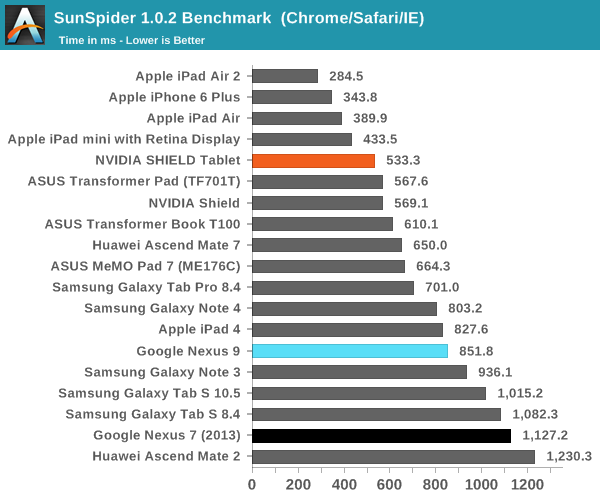
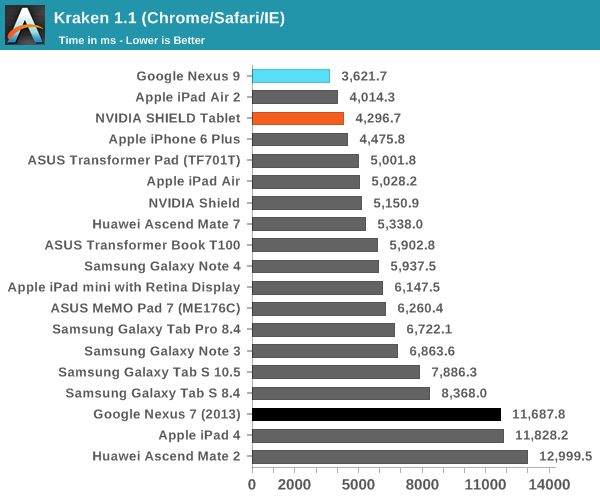
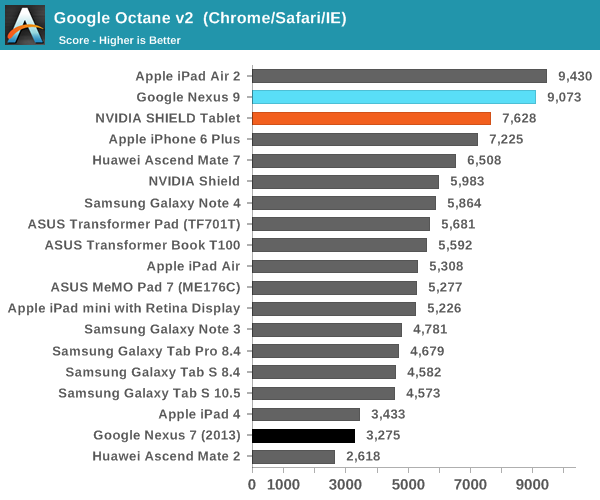
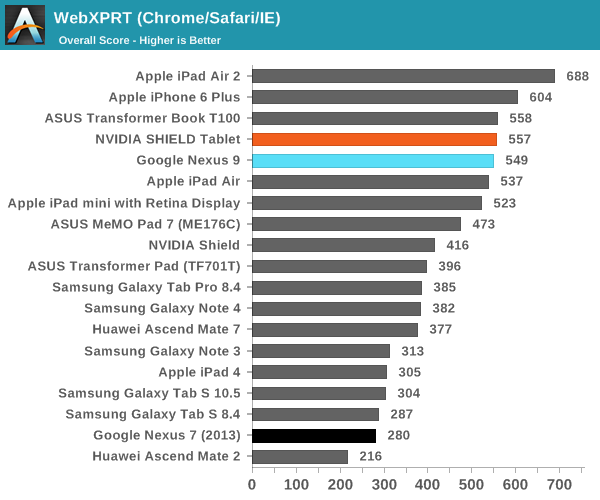
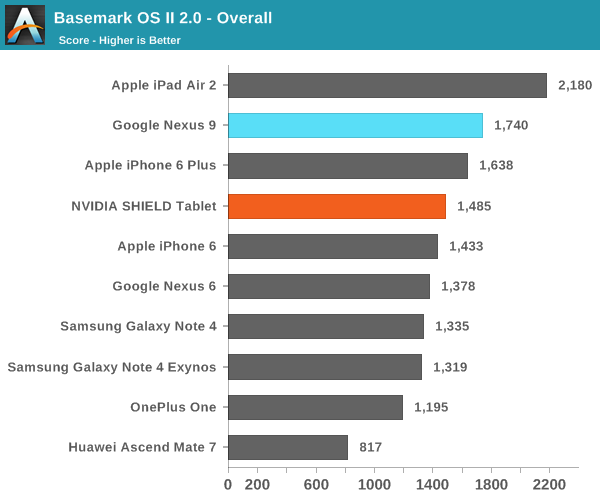
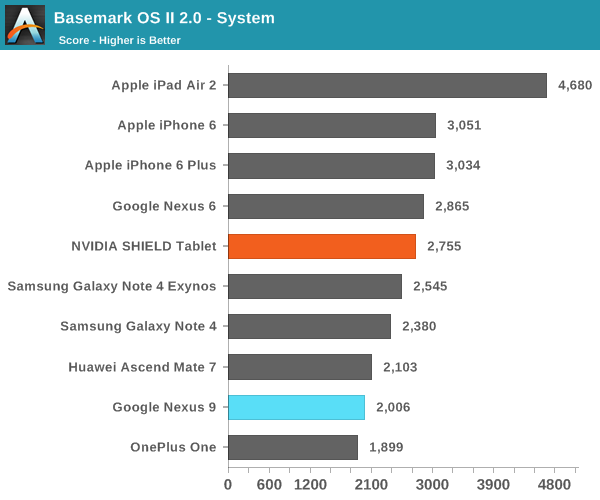
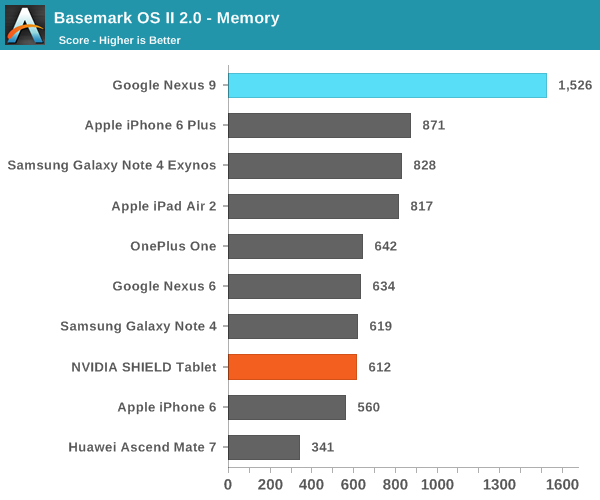
The Basemark System test seems to contribute quite strongly to how the Nexus 9 performs in the overall subtest. Given that this is a storage performance benchmark, it's likely that Basemark OS II has issues similar to Androbench on 5.0 Lollipop or that random I/O is heavily prioritized in this test.
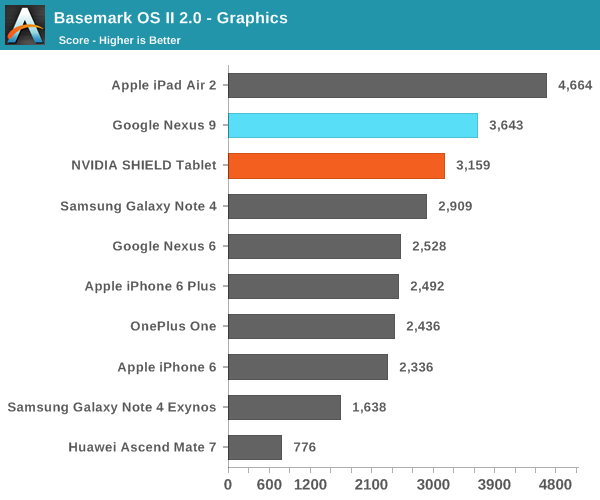
There's a noticeable performance uplift in the graphics test, and although not exactly part of the CPU this does seem at least somewhat plausible as GPU driver updates can improve performance over time.
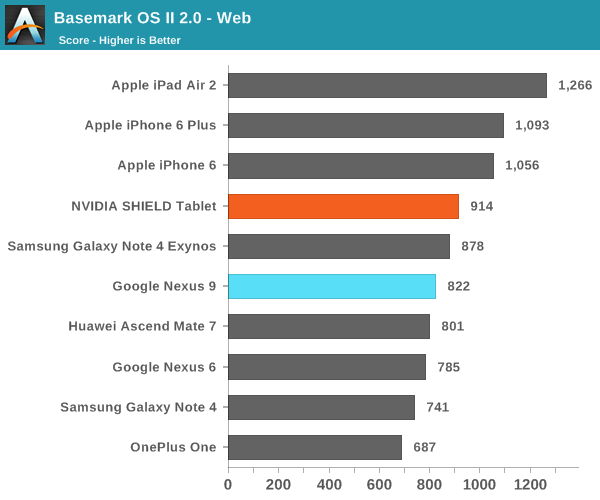
Overall, performance seems to be quite checkered, although improved from our initial evaluation of the Nexus 9. Unfortunately, even in benchmarks where the DCO should be able to easily unroll loops to achieve massive amounts of performance, we see inconsistent performance in Denver. This may come down to an issue with the DCO, or even more simply the fact that Denver is spending more time than it would like to directly executing ARM code as opposed to going through the DCO.
In this case looking at the SunSpider and Kraken javascript benchmarks offers an interesting proxy case for exactly that scenario. SunSpider on modern CPUs executes extremely quickly, so quickly that the individual tests are often over in only a couple of dozen of milliseconds. This is a particularly rough scenario for Denver, as it doesn’t provide Denver with much time to optimize, even if the code is run multiple times. Meanwhile Kraken pushes many similar buttons, but its tests are longer, and that gives Denver more time to optimize. Consequently we find that Denver’s SunSpider performance is quite poor – underperforming even the A15-based Tegra K1-32 – while Denver passes even the iPad Air 2 in Kraken.
Ultimately this kind of inconsistent performance is a risk and a challenge for Denver. While no single SoC tops every last CPU benchmark, we also don’t typically see the kind of large variations that are occurring with Denver. If Denver’s lows are too low, then it definitely impacts the suitability of the SoC for high-end devices, as users have come to expect peppy performance at all times.
In practice, I didn't really notice any issues with the Nexus 9's performance, although there were odd moments during intense multitasking where I experienced extended pauses/freezes that were likely due to the DCO getting stuck somewhere in execution, seeing as how the DCO can often have unexpected bugs such as repeated FP64 multiplication causing crashes. In general, I noticed that the device tended to also get hot even on relatively simple tasks, which doesn't bode well for battery life. This is localized to the top of the tablet, which should help with user comfort although this comes at the cost of worse sustained performance.










169 Comments
View All Comments
UtilityMax - Sunday, February 15, 2015 - link
I don't fully understand you comment about the SoC? You think web browser is using the hardware somewhat differently from the dedicated apps?My comment is about the fact that there is not point to have most of the dedicated apps when you have a tablet with a screen the size of a small laptop or netbook. Just fire up the web browser and use whatever web site you need. Most dedicated mobile apps exist because the screen size of a cell phone is pretty small, which can make for an awkward experience even when you pull a mobile web site though a web browser.
UtilityMax - Sunday, February 8, 2015 - link
It's not entirely true that there isn't much in the tablet space, besides Nexus 9 and Galaxy Tab S. If your pockets are deep enough, you could always get the Apple iPad Air 2. Apple gives you a well balanced tablet with great build quality, fine screen, CPU/GPU performance, and battery life. The only thing that's missing is an SD card slot, but at least there is an option a 64 or 128GB model. Personally, I ended buying a Tab S 10.5 because it was truly difficult to resist it at only $400 sale price, plus $35 for a 64GB SD card. Despite all the disappointing benchmarks, Tab S provides a pretty smooth and fluid android experience with a great screen. Battery life is the only thing that's getting on the way. Five hours of web browsing or standby is pretty disappointing.wintermute000 - Monday, February 9, 2015 - link
Sony Xperia Tablet Z2. SoC is one gen behind but if you can get it for a good price, you're laughing. Fantastic build, clean stock software, lag free.sunil5228 - Sunday, February 8, 2015 - link
Brilliant ! Esp loved the segway into the Denver CPU and dual vs quad arcitechture comparisons,very eye opening. thankyou sirbdiddytampa - Wednesday, February 11, 2015 - link
Picked one of these up a couple weeks ago and love it. It performs phenomenally well, and looks great. It's a bit heavy for its size and the thin bezel on the sides makes it difficult to hold with one hand without touching the screen, but overall its a fantastic tablet. Highly recommend it.Ozo - Monday, February 16, 2015 - link
Thanks for the lucid explanation of Denver.Any insight into why Google/HTC dropped the ball on "wireless" Qi charging? Especially when it was finally added to the Nexus phone!?!
I was set to upgrade from my Nexus 7 (2013), but no Qi = no sale. :(
Fardreit - Monday, February 23, 2015 - link
I'll be honest: I don't understand 80% of what the reviewer wrote. But the 20% that I do understand is enough for me to appreciate the conclusions drawn. I value the informed reviews here much more than those at the 'fan' websites. At Anandtech, people really know what they're talking about, even if I don't.When I'm able to follow the high-tech insults you guys sling at each other, then I know I've made progress.
flashbacck - Wednesday, February 25, 2015 - link
Does the Shield Tablet use a similar DCO? I have noticed during it has performance issues during regular use. I wonder if it's this DCO that still needs work.ahcox - Thursday, February 25, 2016 - link
What is the accuracy of the image labelled "K1-64 Die Shot Mock-up"? Is it a colorized and enhanced version of a real die photograph or is it a pure invention? That 16 * 12 array dominating the picture seems a little off to me: surely there should be structures common to each 16*2 group forming an SMX? Kepler is not a simple tiled sea of cores.